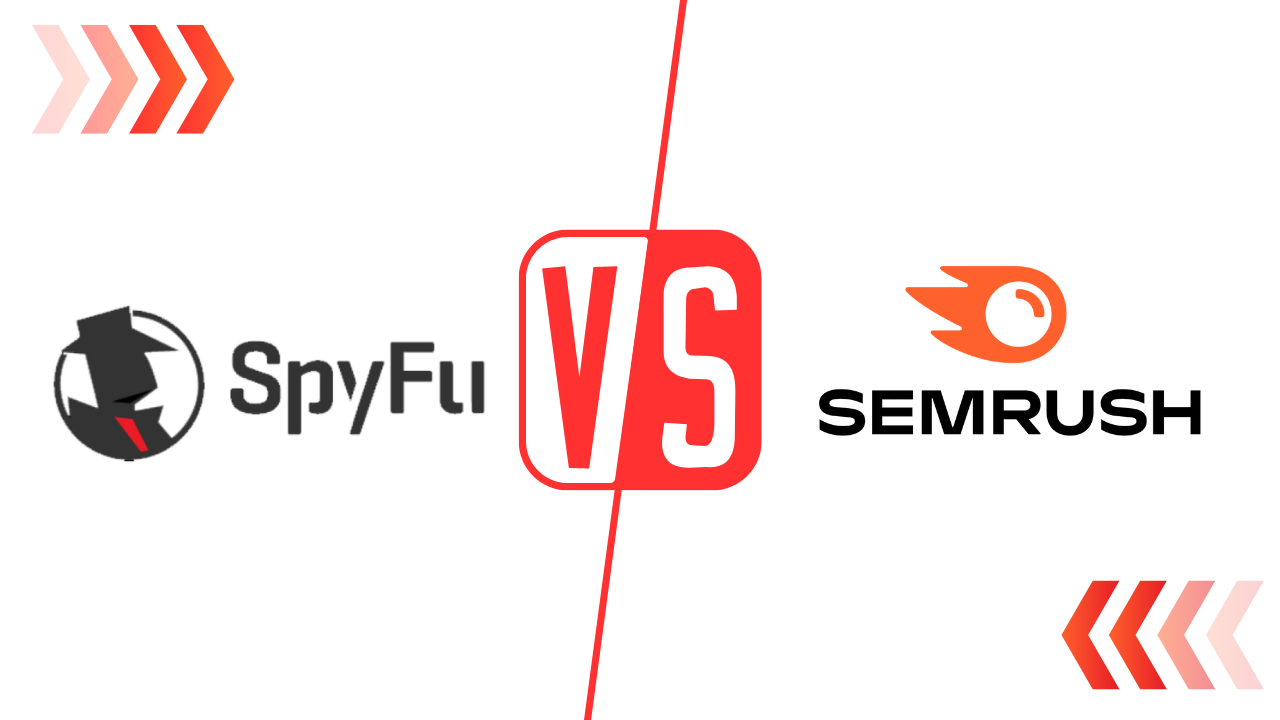Search Engine Optimization (SEO) is critical for businesses aiming to enhance their online presence, drive traffic, and convert visitors into customers. Among the many tools available for SEO, SpyFu and SEMrush stand out as two of the most popular choices. However, picking between these tools can be challenging due to the wide array of features both offer.
In this blog post, we’ll dive deep into the SpyFu vs SEMrush comparison, analyzing their features, pricing, usability, pros and cons, and other aspects to help you decide which one best fits your business’s SEO needs.
Table of Contents
Quick Comparison
For those in a rush, here’s a brief comparison between SpyFu vs SEMrush:
- SpyFu: Best for businesses and individuals who are focused primarily on competitive research and keyword analysis. It offers in-depth competitor insights at a budget-friendly price, making it an excellent choice for smaller businesses or SEO professionals who want to understand their competitors’ strategies.
- SEMrush: A more comprehensive marketing suite that goes beyond SEO. SEMrush provides tools for social media management, content marketing, paid search (PPC), and more. It’s an excellent choice for larger businesses or agencies that need a full marketing solution.
Now, let’s dive into the details.
Features
1. Competitive Analysis
Both SpyFu and SEMrush excel at helping you analyze your competitors’ digital strategies, but they approach it differently.
SpyFu is well-known for its competitive analysis features. It allows you to track your competitors’ most profitable keywords, both in organic search and paid campaigns (PPC). You can see which keywords are driving traffic to their site and get a full picture of their advertising spend. One standout feature is SpyFu’s ability to reveal competitor ad history, showing you how their ad strategy has evolved over time.
In contrast, SEMrush also provides powerful competitive analysis tools but offers more in-depth reports and analytics. You can track competitors’ organic and paid keywords, identify backlink opportunities, and audit their websites for technical SEO issues. SEMrush’s Traffic Analytics tool allows you to compare your site traffic with competitors and assess overall market trends, helping you uncover hidden growth opportunities.
Verdict: SpyFu offers better competitive insights for smaller teams or those focused on direct keyword and PPC data, while SEMrush is ideal for businesses that need comprehensive competitor analysis, including traffic insights and backlink data.
2. Keyword Research
Keyword research is at the core of any SEO strategy. Both tools shine in this department but with slightly different focuses.
SpyFu provides detailed keyword research with a primary focus on competitors. You can discover which keywords competitors rank for, how much traffic those keywords bring, and their overall keyword strategy. The Keyword Kombat tool is an especially useful feature for identifying keywords that your competitors rank for, but you don’t.
SEMrush also provides robust keyword research tools, including the popular Keyword Magic Tool. This feature lets you explore long-tail keywords, related phrases, and keyword difficulty, making it easier to target niche markets. SEMrush also excels in keyword tracking, allowing you to track your performance for specific keywords over time and compare it to competitors.
Verdict: SpyFu is a great option for competitor-based keyword research, but SEMrush offers more versatile and detailed tools for expanding keyword lists and refining content strategies.
3. Backlink Analysis
Backlinks are essential for improving domain authority and search engine rankings, and both tools offer strong backlink analysis capabilities.
SpyFu allows you to see the backlinks that your competitors have, including the highest authority links that drive the most value. This helps you uncover new link-building opportunities and refine your off-page SEO strategy.
SEMrush takes backlink analysis a step further with its Backlink Audit Tool, which helps you assess the health of your backlink profile. It flags harmful links that may be hurting your SEO and gives recommendations for disavowing them. SEMrush also provides a Backlink Gap Tool, which allows you to compare your backlinks with competitors and find opportunities where they’re succeeding, but you’re not.
Verdict: While SpyFu gives valuable backlink insights, SEMrush’s backlink audit and gap analysis tools make it the better choice for businesses looking to improve their off-page SEO.
4. Site Audits and Technical SEO
Technical SEO is critical for ensuring that search engines can crawl, index, and rank your website efficiently. Here’s how both tools perform:
SpyFu has limited functionality when it comes to technical SEO audits. It can provide insights into your on-page SEO, such as keyword usage and basic site health, but it lacks the comprehensive technical analysis that some larger sites may need.
SEMrush, on the other hand, excels in site audits. Its Site Audit Tool provides in-depth reports on technical issues like broken links, duplicate content, site speed, and mobile usability. These reports are highly actionable, offering specific steps to fix issues and improve your site’s SEO performance.
Verdict: SEMrush is the clear winner in technical SEO audits and site health analysis.
5. PPC and Paid Search
Both tools allow you to spy on your competitors’ paid search campaigns, but their focus varies.
SpyFu is especially powerful when it comes to PPC research. It shows you which keywords competitors are bidding on, how much they’re spending, and which ads have been most successful for them over time. The tool also provides data on historical ad spend, so you can see how competitors’ strategies have shifted.
SEMrush also offers strong PPC features, allowing you to research keywords for Google Ads, analyze competitors’ ad copies, and track your campaigns. SEMrush, however, integrates these features with other tools, making it more suitable for businesses running both organic and paid marketing campaigns.
Verdict: SpyFu is an excellent choice for PPC analysis, but SEMrush’s integration with other marketing tools makes it better for businesses running full-funnel campaigns.
Personal Experience
In terms of personal experience, both SpyFu vs SEMrush have distinct advantages depending on what stage of SEO or digital marketing you’re at.
SpyFu is exceptionally easy to use, making it a good fit for those who are new to SEO or prefer a streamlined user experience. Its focus on competitive insights and historical PPC data means it’s particularly helpful if you’re looking to understand competitors’ strategies without needing to navigate through complex data.
On the other hand, SEMrush offers a more complex experience due to its wide range of tools, but once you get past the learning curve, the depth of information and versatility it offers is unmatched. For agencies or professionals handling multiple campaigns across SEO, social media, and content marketing, SEMrush is a more comprehensive tool that can handle diverse needs.
Verdict: SpyFu is more suited to beginners and smaller businesses, while SEMrush is ideal for experienced marketers and agencies that need more sophisticated data and integration across multiple channels.
Pricing
In terms of pricing, SpyFu vs SEMrush offers significantly different approaches.
- SpyFu starts at $39/month, making it one of the most affordable SEO tools for competitive analysis and keyword research. The pricing goes up to $78/month for their professional plan, which includes additional features like API access and branded reports.
- SEMrush starts at $139.95/month for their Pro plan, which includes a wide range of features from keyword research to content marketing and social media management. Their Guru plan, priced at $249.95/month, offers additional features like historical data and extended limits.

While SpyFu provides great value for businesses on a budget, SEMrush’s higher price reflects its broader range of tools and capabilities.

Verdict: SpyFu wins in terms of affordability, but SEMrush justifies its higher cost with a more comprehensive toolset.
Pros & Cons
SpyFu Pros:
- Affordable pricing for small businesses.
- Excellent for competitor research and PPC analysis.
- Easy to use, ideal for beginners.
SpyFu Cons:
- Lacks in-depth technical SEO tools.
- Limited features outside of SEO and PPC.
SEMrush Pros:
- Comprehensive marketing suite with tools for SEO, social media, and content marketing.
- Excellent site audits and keyword tracking capabilities.
- Robust backlink analysis and tracking features.
SEMrush Cons:
- Higher price, which may not be suitable for smaller businesses.
- Steeper learning curve due to the sheer number of features.
Alternatives
If you find that neither SpyFu vs SEMrush meets your exact needs, there are some excellent alternatives:
- Ahrefs: Known for its comprehensive backlink analysis and keyword research capabilities, Ahrefs is a top competitor to both tools. Its pricing is on par with SEMrush, and its interface is incredibly user-friendly.
- Moz: Moz offers excellent SEO tracking and keyword research features, along with its proprietary Domain Authority (DA) metric. However, Moz lacks some of the advanced marketing tools offered by SEMrush.
- Serpstat: A more affordable option, Serpstat provides many of the same features as both SpyFu and SEMrush, but at a lower price point, making it a solid choice for smaller businesses.
Conclusion: Who is the Winner?
In the battle of SpyFu vs SEMrush, the winner depends on your specific needs.
- SpyFu is the clear winner for smaller businesses or individuals looking for a budget-friendly tool focused on competitive research and PPC analysis. It’s straightforward and delivers excellent insights at an affordable price.
- SEMrush, on the other hand, is the go-to choice for larger businesses, agencies, or marketers needing a more comprehensive digital marketing suite. Its range of tools covers everything from SEO and PPC to content marketing and social media, making it a one-stop-shop for digital marketing.
Ultimately, the decision between SpyFu vs SEMrush comes down to the scope of your marketing efforts, your budget, and your experience with SEO tools.




